
A Quarterly Resource Bulletin from Capital Link | Spring 2019
Message from the CEO
As we continue to celebrate our silver anniversary year, this issue’s 25th Anniversary Highlights article reflects upon how we’ve expanded our capacity to help health centers improve their business operations and financial health. It’s been interesting to see how much we – and our marketing materials – have evolved over the years.
This issue also contains valuable information for health centers who may be seeking funding for expansion projects in the near future. The Federal Update section highlights the recent New Markets Tax Credit allocation announcement and the New and Noteworthy section reviews the updated HRSA Loan Guarantee Program.
Also in this issue are newly released resources, health center highlights, and a list of our upcoming trainings and webinars.
Warm Regards,
Allison Coleman, CEO
Federal Update
Below is a selection of recent health policy and regulatory news and information relevant to health centers and PCAs. For regular updates, subscribe to Capital Link’s blog, or access NACHC’s blogs and the HRSA’s health center webpage.
FY2020 Spending Bill Update
On April 30th, the House Appropriations committee voted to approve the Fiscal Year 2020 Labor-HHS-Education Funding bill. The bill includes increases over the current funding levels for workforce, health care, and education programs in FY20, providing $1.68 billion for health centers, an almost $50 million increase over approved funding for FY19. The entire House will vote on this bill, among others, beginning on June 12th. A summary of the House spending bill is available here.
New Markets Tax Credits
May 23, 2019 – The U.S. Department of the Treasury’s Community Development Financial Institutions Fund announced the awardees for the 2018 round of New Markets Tax Credit (NMTC) allocations. The $3.5 billion in awards are aimed at revitalizing low-income communities and increasing economic opportunity nationwide.
To date, health centers have raised more than $3.6 billion for their capital projects through NMTC and these projects are highly desirable investments for NMTC allocatees and investors. While NMTC financing is a critical source of low-cost capital and equity for health center facility projects—often securing approximately 20-25% of total project costs—obtaining tax credits from community development entities (CDEs) is a competitive and complex process. Interested health centers must demonstrate a high level of project readiness and be able to communicate the merits of their projects to Community Development Entities (CDEs) with allocation. Furthermore, the process of structuring and closing an NMTC transaction is complicated and the terms, benefits, and fees offered to borrowers vary widely.
Health centers wanting to explore this option should act now. While the program is authorized through the end of 2019, it is unclear whether tax reform efforts could change or eliminate access to this important resource in the future.
Health centers interested in considering this financing option should access our series of three Spotlight on Capital Resources issues describing the NMTC program here or a recording of our recent webinar, Funding Sources for FQHC Capital Projects: Updates on New Markets Tax Credits and HRSA's Loan Guarantee Program here.
HRSA Awards $24 million to Fight Substance Use Disorders in Rural Communities
The Health Resources and Services Administration’s Federal Office of Rural Health Policy has awarded $24 million for the second round of Rural Communities Opioid Response Program (RCORP) planning grants [see press release] to organizations, including health centers (see the list of awardees here).
The awards are part of a broad multi-year strategy to address the nationwide epidemic of opioid use disorder (OUD). Recipients receive $200,000 for one year to formalize partnerships with local stakeholders, conduct needs assessments, and develop plans to implement and sustain prevention, treatment, and recovery interventions for substance use disorders (SUD), including OUD.
New and Noteworthy
The HRSA Health Center Facility Loan Guarantee Program
Originally authorized by Congress in 1997, the HRSA Loan Guarantee Program (LGP) offers loan guarantees for the construction, renovation, and modernization of medical facilities operated by health centers. Authorized under Part A of Title XVI of the Public Health Service Act, the guarantee can cover up to 80% of the principal amount of loans made by non-federal lenders. In 2018, Congress appropriated new funds for the program, enabling HRSA to update and modernize it to provide guarantees for almost $900 million in loans to health centers going forward.
The purpose of a loan guarantee is to enhance the health center’s credit profile, reducing the lender’s risk and allowing it to lend to health centers under more favorable terms than would have been possible otherwise. For some centers, a loan guarantee could mean the difference between getting a “yes” versus a “no” from a lender, while for others, it may allow the lender to offer a lower interest rate, a longer fixed-rate term, or a higher loan-to-value ratio, or other benefits.
While the details of the new program are still being finalized, Capital Link is working closely with HRSA to provide a range of trainings and assistance on the program to health centers and lenders.
In addition to offering trainings on the LGP, with support from HRSA, Capital Link can directly assist a limited number of health centers with preparing program application materials. Funding for this assistance is limited, so please contact Jonathan Chapman, Director of Community Health Center Advisory Services, at This email address is being protected from spambots. You need JavaScript enabled to view it. as soon as possible.
Learn more about the LGP, as well as the New Markets Tax Credit (NMTC) program, at our upcoming webinar:
Health Center Capital Project Financing Sources: HRSA’s LGP and NMTC
Thursday, June 20, 2019, 2:00 pm - 3:00 pm EDT
Presenters: Allison Coleman, CEO
Access the recordings/slides of our recent webinars, Demystifying HRSA’s Loan Guarantee Program, a two-part webinar series sponsored by NACHC:
Part I: HRSA's Loan Guarantee Program Explained
Presenter: Allison Coleman, CEO
Slides | Recording
Part II: HRSA's Loan Guarantee Program Q&A
Presenters: Allison Coleman, CEO, and Capital Link Health Center Advisory Services team members
Slides | Recording
We will also provide trainings at several upcoming regional NACHC and State PCA conferences, including:
NACHC Elevating Health Center Operations (EHCO)
Thursday, June 13, 2:45-3:45 pm
Portland, OR
Presenter: Jonathan Chapman, Director of CHC Advisory Services
Please continue to check Capital Link’s website and HRSA’s LGP webpage for new information on the program as it becomes available.
25th Anniversary Highlights
Leveraging Capital Planning Resources for Growth and Performance Improvement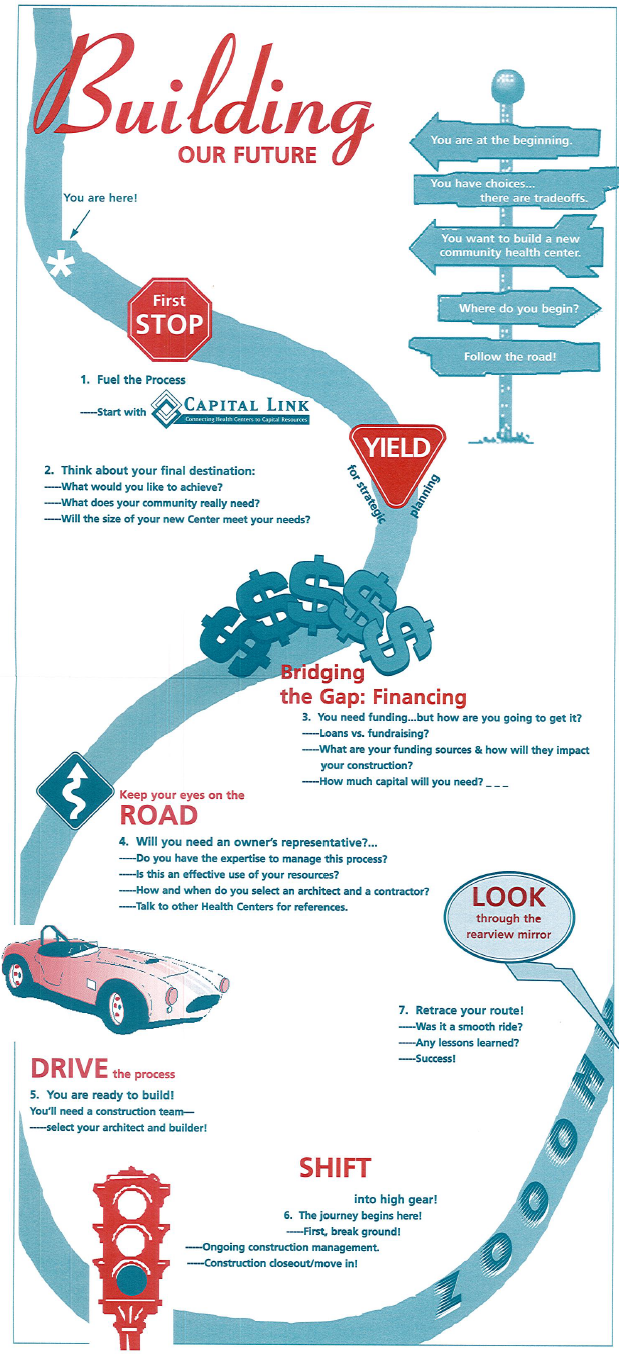
Over our long history, we’ve discovered that many of the tools and resources we developed to assist health centers with capital planning when Capital Link was first established are also useful for other initiatives. In particular, many of our resources can be used for growth planning and operational and financial performance improvement, whether or not a health center is planning a capital project.
In one of our early campaigns, Building Our Future, we explained that for a capital project you need a compelling community need to support the case for investment. And that you might identify that need by conducting a market analysis and documenting the community impacts of meeting the need by doing a value and impact analysis. These analyses are also needed for successful growth planning and performance improvement. Health centers need to demonstrate a compelling community need to support the case for growth and to provide the impetus for performance improvement—making a market assessment and impact analysis very useful in these contexts too.
The next step is to create a road map that responds effectively to the community need. In a capital planning context, the road map might be called a business plan, coupled with a “master facilities plan.” In a growth planning context, you’d call it a strategic plan. In a performance improvement context, you’d call it a business plan or, perhaps, a “corrective action plan.”
Whether you are undertaking a capital project or seeking to grow or improve, you need strong initial operations, a strong operational plan, and achievable targets based on best practice benchmarks. You also need strong financial performance, as demonstrated through historical and projected financials. And, of course, capital project success and successful growth and improvement are always dependent upon strong leadership across the organization.
Resources
The following is a list of recently released industry-related resources for health centers and PCAs. For a comprehensive collection of health center industry-related resources, tools, and information, visit the Health Center Resource Clearinghouse at www.healthcenterinfo.org.
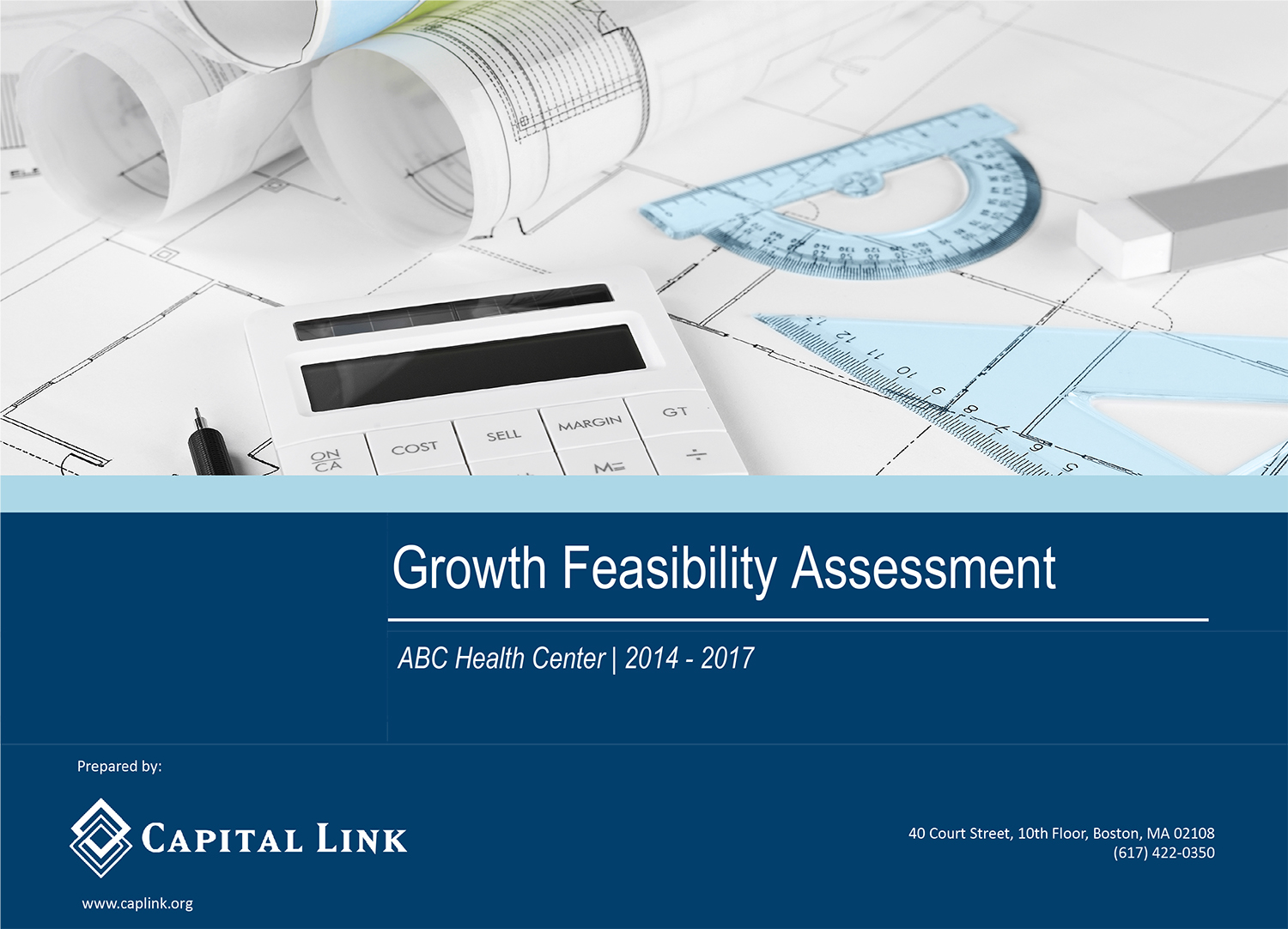
Growth Feasibility Assessment
Designed as a diagnostic tool to assisting health centers in determining the feasibility for facilities expansion project, Capital Link has just released the Growth Feasibility Assessment. This new report features a debt capacity analysis and dashboard summaries of key financial and operational performance measures benchmarked against peer results over a three-year period. To learn more about this new tool, please contact Jennifer Saber, Director of Data and Analysis, at This email address is being protected from spambots. You need JavaScript enabled to view it..
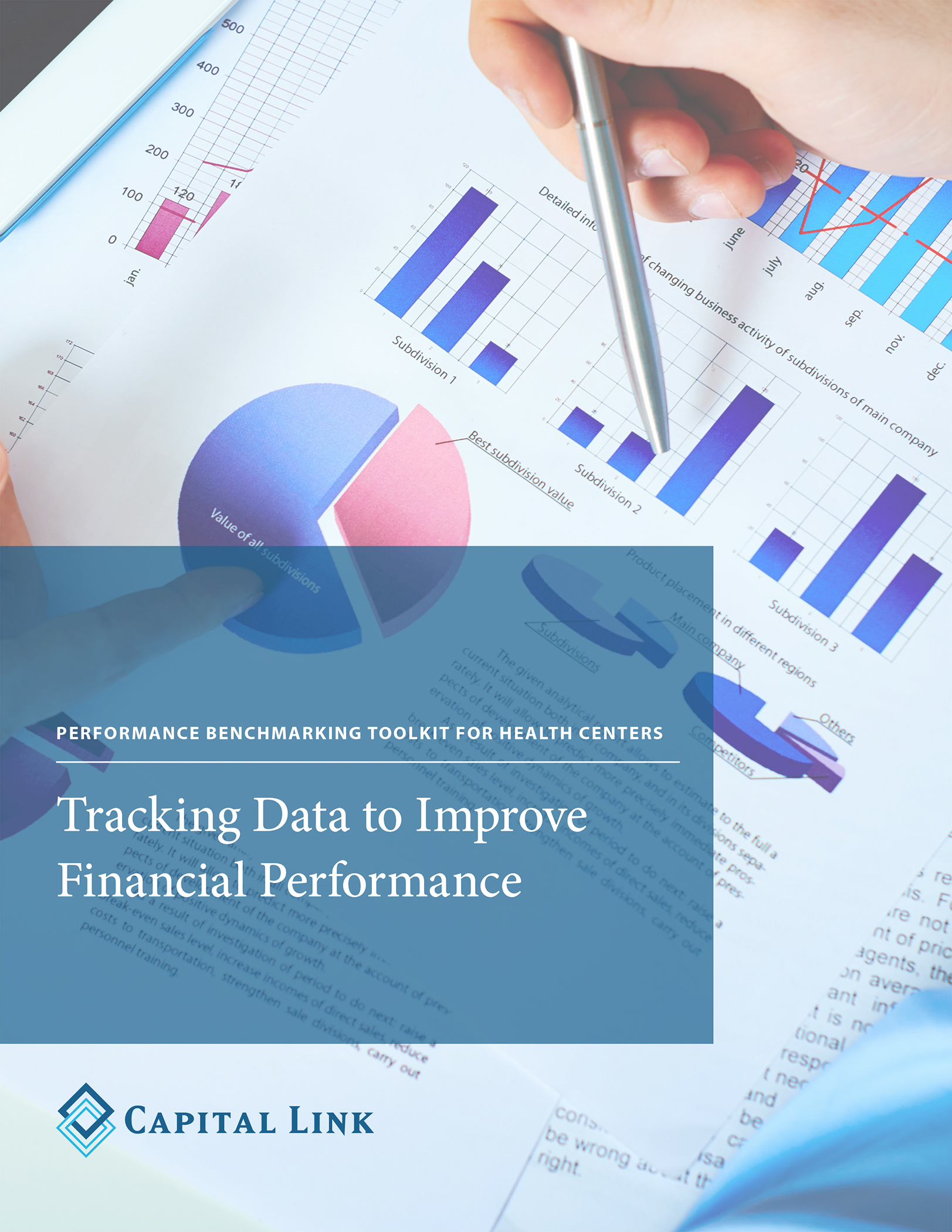
Performance Benchmarking Toolkit - UPDATE
Our newly-updated toolkit provides guidance in applying data analysis tools to help health centers more effectively track performance, understand key drivers, and incorporate operational insights for financial sustainability. Click here to download the toolkit.
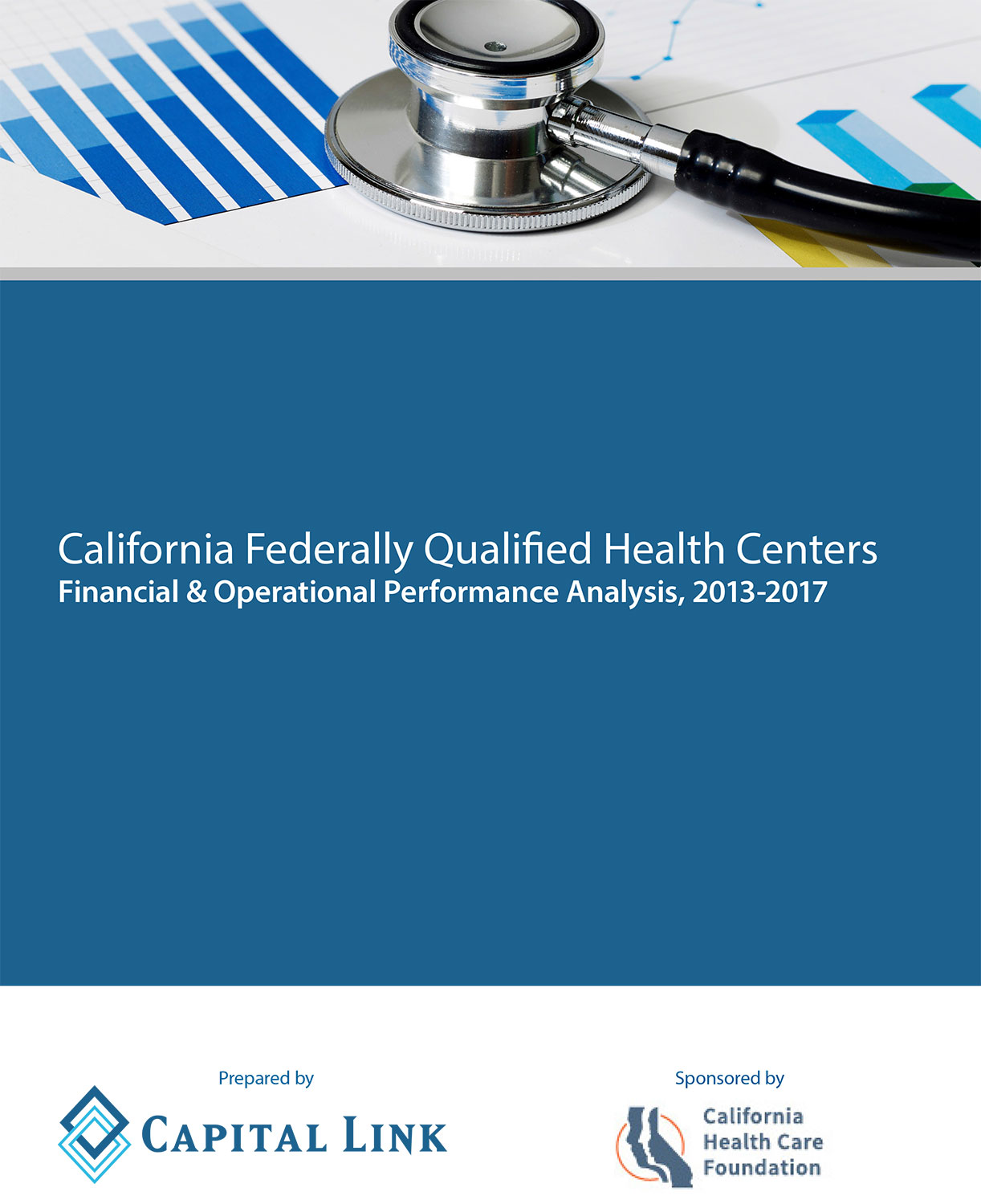 California Federally Qualified Health Centers: Financial & Operational Performance Analysis, 2013-2017
California Federally Qualified Health Centers: Financial & Operational Performance Analysis, 2013-2017
Capital Link recently released findings from an updated analysis, sponsored by the California Health Care Foundation. This report provides statewide financial and operational trends over a five-year period. Click here for a free download.
New Uniform Data System Manual Now Available
HRSA has released the 2019 Uniform Data System (UDS) Manual which serves as a comprehensive guide for health centers to understand UDS reporting requirements. Changes to this year’s UDS reporting include data to better capture mental health and substance use disorder (SUD) services, reporting virtual visits, the addition of an electronic-specified statin therapy for cardiovascular disease clinical quality measure (CMS347v2), and workforce development data. Watch a recording (or view the slides) of HRSA’s recent webinar highlighting these changes.
New Brief Showcases Health Centers’ Vital Contributions
NACHC recently released a new data-driven brief showing the incredible value that health centers bring to the communities they serve. The brief highlights who health centers serve, how they are responsive to community needs, drive innovations, and deliver high-quality, cost-effective care. Click here to see the new brief.
HRSA New Training and Technical Assistance Hub
HRSA recently announced the launch of a new Training and Technical Assistance Hub (Hub). The Hub is an easy way to find technical assistance centers associated with many of HRSA’s programs, and includes information of interest to safety net providers and training/education programs.
The search function allows users to find resources quickly, or users can browse by topic (for example: older adult health) or by HRSA bureau/office. The Hub is a one-stop-shop for accessing HRSA's training and technical assistance resources.
Rural Telehealth Toolkit
The Rural Health Information Hub’s recently released Rural Telehealth Toolkit compiles evidence-based and promising models and resources to support organizations in identifying and implementing telehealth programs to address common challenges experienced in rural communities across the US.
COMING SOON - Federally Qualified Health Centers Financial and Operational Performance Analysis, 2014-2017
This report provides an aggregate financial and operational profile of Federally Qualified Health Centers nationally from 2014 to 2017, including new information on urban and rural health centers. By presenting multi-year trends, the analysis offers a framework for identifying financial strengths, challenges, and opportunities for performance improvement. Prepared with support from the Health Resources and Services Administration.
The report will be availabe at the end of June.
Health Center Highlights
Capital Link regularly profiles health centers that have successfully completed their expansion plans. These health center stories are available on our website.
Progress Update for Unity Care Northwest, WA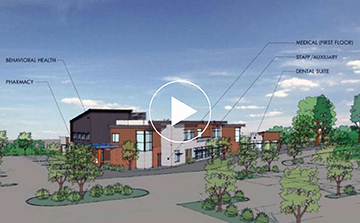
In August of 2018, Capital Link’s affiliate Capital Fund participated in a financial closing to support a $15 million health center capital expansion project for Unity Care Northwest in Bellingham, WA. Click on the image to watch a captivating progress update of the expansion.
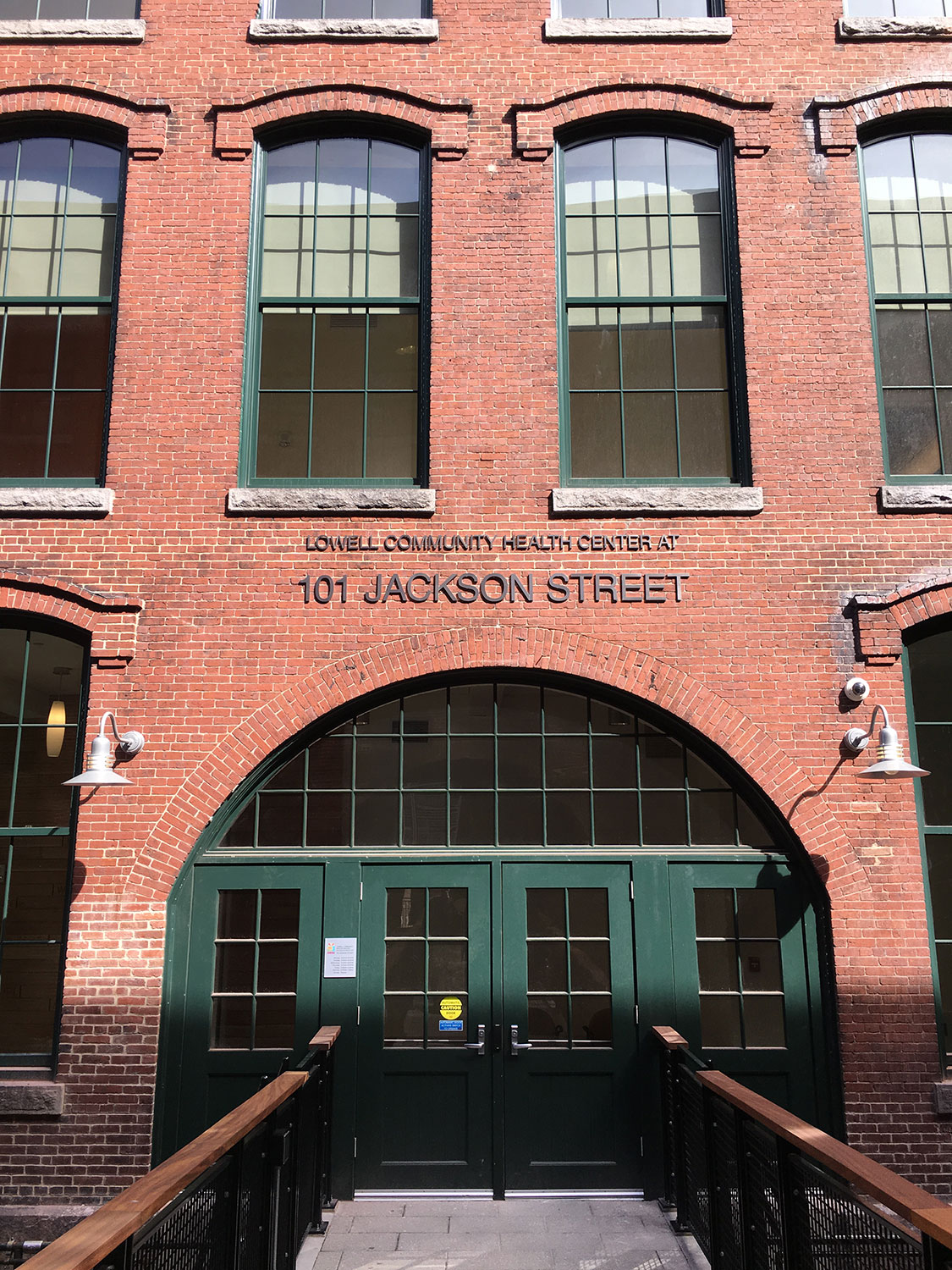 Lowell Community Health Center’s 101 Jackson Street Expansion Honored with Mayor Thomas M. Menino Legacy Award
Lowell Community Health Center’s 101 Jackson Street Expansion Honored with Mayor Thomas M. Menino Legacy Award
Lowell Community Health Center, MA was recently awarded the coveted 2019 Mayor Thomas M. Menino Legacy Award from Preservation MA, the statewide non-profit historic preservation organization. The award is given to transformative, community-focused projects that "revitalize the best of the past to make something good for the future."
In announcing the award, Preservation MA remarked, "The colors, spaces, and historic details throughout the facility evoke a peaceful and warm healthcare experience." Capital Link and Capital Fund assisted Lowell CHC with financing this expansion, and offer warm congratulations.
Upcoming Events
Presentations
Capital Link regularly attends industry conferences to exhibit, conduct trainings, and present information related to capital development to health centers and primary care associations. Below are a few of our next scheduled events. Learn more here.
NACHC Elevating Health Center Operations (ECHO)
June 12-13, 2019
Portland, OR
Utilizing HRSA’s Loan Guarantee Program to Acquire Lost-Cost Capital for Facility Needs
Thursday, June 13, 2:45-3:45 p.m.
Presenter: Jonathan Chapman, Director of CHC Advisory Services
NACHC Community Health Institute (CHI)
August 18-20, 2019
Chicago, IL
Reducing Capital Project Financing Costs: the HRSA’s Loan Guarantee Program and New Markets Tax Credits
Tuesday, August 20, 1:30-2:30 p.m.
Presenter: Allison Coleman, CEO
Webinars
Capital Link offers webinars designed to offer useful information for health centers on a wide range of topics. The webinars have no charge, but participation is limited. Access complete descriptions of the webinars here and recordings of past webinars here.
Achieving Social Determinants of Health Goals through Capital Expansion
Wednesday, June 19, 2:00 pm - 3:00 pm EDT
Presented by: Mark Lurtz, Director of Partnership Development, Adrienne Cooksey, Associate Project Consultant, Capital Link; and Jane Bilger, Senior Program Manager, Corporation for Supportive Housing
This session will define the Social Determinants of Health, explore how to determine where community gaps are within a service area, and provide lessons learned on developing partnerships to address SDOH, drawing from our Capital Expansion for Health and Housing Partnerships learning collaborative.
Health Center Capital Project Financing Sources:
HRSA’s Loan Guarantee Program and New Markets Tax Credits
Thursday, June 20, 2019, 2:00 pm - 3:00 pm EDT
Presenter: Allison Coleman, CEO, Capital Link
Join Capital Link to learn more about the Health Resources and Services Administration's (HRSA's) greatly-expanded and streamlined Health Center Facility Loan Guarantee Program. The program offers loan guarantees for eligible Health Center Program awardees for the construction, renovation, and modernization of medical facilities. The purpose of the program is to enhance a health center’s credit profile, reducing the lender’s risk and allowing the lender to provide a loan under more favorable terms than would have been possible otherwise.
Facilitating Change: Working Together, Engaging Others and Motivating for Change
Tuesday, June 25, 2019, 2:00 pm - 3:00 pm EDT
Presenter: Melissa Schoen, Schoen Consulting
Health centers are undergoing tremendous changes: considering shifting to value-based payment models; continuing to implement and optimize technology; creating data-driven quality improvement programs; and developing and enhancing multi-disciplinary care teams. This webinar will provide strategies for leading change in your health center, including how to develop strong teams to implement new initiatives, and communicate and gain commitment to increase the probability for stakeholders to accept and increase your organization’s capacity to change.
Proactive Scenario Planning: Modeling Financial Implications
Thursday, June 27, 2019, 2:00 pm - 3:00 pm EDT
Presenter: Tony Skapinsky, Project Consultant, Capital Link
This webinar discusses capital project planning scenarios in a changing environment and demonstrates top-line financial implications of potential changes to reimbursement policies and Medicaid payments, and how the changes impact capital projects, using a tool Capital Link has developed.
Access recordings of our recent webinars:
-
Developing a Community Health Center Capital Project Plan and Budget – Part One
-
Developing a Community Health Center Capital Project Plan and Budget – Part Two
-
Rekindling Joy in Practice: Creating a Place for Joy - This session was presented as part of the Association of Clinician for the Underserved STAR² Center's Burnout 201 Webinar Series. Cindy Barr, Operations and Facilities Planner, shared her thoughts on creating a "place for joy" and the effect of the built environment on burnout in a health center setting.

